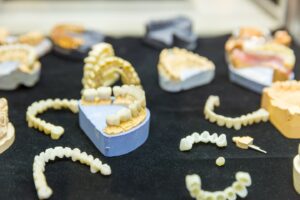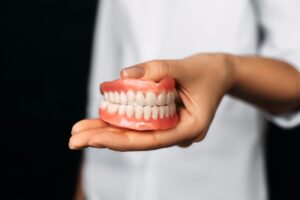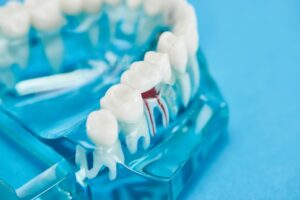When it comes to replacing missing teeth, two of the most common options are dental implants and traditional dentures. Each has its own set of advantages and potential drawbacks, making the choice between them dependent on your specific dental needs, lifestyle, and preferences. This article will help you understand the key differences between dental implants and traditional dentures, aiding you in making an informed decision about which option might be right for you.
Understanding Dental Implants
What Are Dental Implants? Dental implants are artificial tooth roots made of titanium that are surgically placed into the jawbone. Once integrated with the bone, they provide a stable base for a crown, bridge, or denture.
Advantages of Dental Implants:
- Durability: Implants are highly durable and can last a lifetime with proper care.
- Stability: They provide a stable and secure fit, eliminating the worry of slippage.
- Natural Appearance: Implants look and feel like natural teeth, providing a more aesthetically pleasing result.
- Bone Preservation: Implants stimulate the jawbone, helping to prevent bone loss that typically occurs with missing teeth.
- Comfort: Implants are comfortable and function like natural teeth, making eating and speaking easier.
Potential Drawbacks:
- Cost: Implants are generally more expensive than dentures, with costs varying based on the number of implants and additional procedures required.
- Surgical Procedure: The process requires surgery, which carries risks and involves a longer recovery time.
- Time: The implant process can take several months, including healing time after the surgery.
Understanding Traditional Dentures
What Are Traditional Dentures? Traditional dentures are removable prosthetic devices designed to replace missing teeth. They rest on the gums and can be full (replacing all teeth) or partial (replacing some teeth).
Advantages of Traditional Dentures:
- Affordability: Dentures are typically more affordable than dental implants.
- Non-Surgical: Getting dentures does not require surgery, making the process less invasive and quicker.
- Quick Solution: Dentures can be made and fitted relatively quickly compared to the implant process.
Potential Drawbacks:
- Stability: Dentures can sometimes slip or shift in the mouth, causing discomfort or embarrassment.
- Bone Loss: Dentures do not stimulate the jawbone, which can lead to bone loss over time and changes in facial structure.
- Maintenance: Dentures require daily removal and cleaning, and they may need periodic adjustments or replacements due to wear and changes in the mouth.
- Comfort: Some people find dentures uncomfortable, especially when eating or speaking.

Comparing Dental Implants and Traditional Dentures
1. Appearance and Function:
- Dental Implants: Provide a natural look and feel, closely mimicking the function of natural teeth. They allow you to eat, speak, and smile with confidence.
- Traditional Dentures: While modern dentures can look natural, they may not feel as comfortable or stable as implants. They can also affect the taste of food and speech.
2. Longevity:
- Dental Implants: With proper care, implants can last a lifetime, making them a long-term solution.
- Traditional Dentures: Typically last 5-10 years before needing replacement due to wear or changes in the mouth.
3. Cost:
- Dental Implants: Higher initial cost but may be more cost-effective over time due to their durability and longevity.
- Traditional Dentures: Lower upfront cost, but may incur additional costs over time for adjustments, replacements, and maintenance.
4. Comfort and Convenience:
- Dental Implants: Once healed, implants are low-maintenance and do not require special care beyond regular brushing and flossing.
- Traditional Dentures: Require daily removal and cleaning, and may need adhesives to stay in place. Some people may find them less comfortable and more cumbersome.
5. Health Benefits:
- Dental Implants: Promote bone health and prevent bone loss by stimulating the jawbone.
- Traditional Dentures: Do not prevent bone loss, which can lead to changes in facial structure and fit issues over time.
Making the Right Choice for You
Consider Your Lifestyle:
- If you prefer a permanent, low-maintenance solution and are comfortable with the idea of surgery, dental implants may be the better choice.
- If you are looking for a non-surgical, more affordable option and don’t mind the maintenance involved, traditional dentures might be suitable.
Assess Your Oral Health:
- Dental implants require sufficient bone density and healthy gums. Your dentist can evaluate your oral health to determine if you are a good candidate for implants.
- Dentures can be an option for patients with less bone density or those who prefer to avoid surgery.
Budget and Insurance:
- Evaluate your budget and check with your insurance provider to see what options are covered. While implants may have a higher upfront cost, their longevity could make them a more cost-effective solution over time.
Both dental implants and traditional dentures offer effective solutions for replacing missing teeth, each with unique benefits and considerations. By understanding the differences and assessing your personal needs, you can make an informed decision that best suits your lifestyle, oral health, and budget. If you’re still unsure, schedule a consultation with our dental professionals to discuss your options and find the best treatment plan for you. Your journey to a restored smile starts with the right choice.







